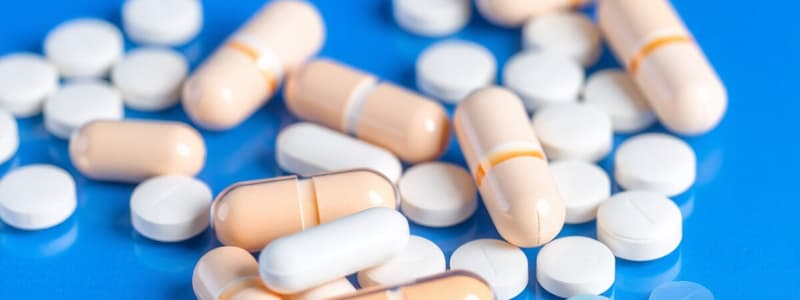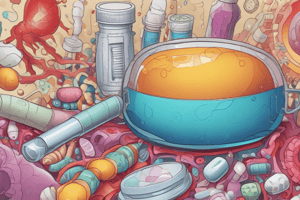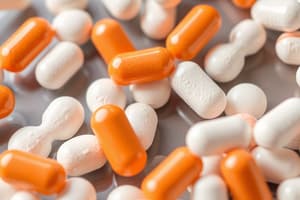Podcast
Questions and Answers
What is a significant characteristic of penicillins?
What is a significant characteristic of penicillins?
- They contain a beta lactam ring. (correct)
- They inhibit protein synthesis.
- They require food intake for better absorption.
- They are exclusively used to treat MRSA.
What is the primary nursing consideration for administering penicillin?
What is the primary nursing consideration for administering penicillin?
- Monitor potassium and electrolytes. (correct)
- Check for allergic reactions only.
- Assess for signs of renal toxicity.
- Monitor liver function tests.
Why might some bacteria be resistant to penicillin?
Why might some bacteria be resistant to penicillin?
- They uptake potassium at a rapid pace.
- They can destroy the beta lactam ring. (correct)
- They have evolved to produce penicillin.
- They are susceptible to antibiotics in all situations.
What side effect is associated with the rapid administration of vancomycin?
What side effect is associated with the rapid administration of vancomycin?
Which of the following is a contraindication for tetracyclines?
Which of the following is a contraindication for tetracyclines?
Which antibiotic class is considered to be broad spectrum and inhibits protein synthesis?
Which antibiotic class is considered to be broad spectrum and inhibits protein synthesis?
What adverse reaction is associated with the use of tetracyclines in patients with kidney disease?
What adverse reaction is associated with the use of tetracyclines in patients with kidney disease?
What is the mechanism of action for cephalosporins?
What is the mechanism of action for cephalosporins?
What is a primary adverse effect associated with aminoglycosides?
What is a primary adverse effect associated with aminoglycosides?
Which antibiotic should not be administered to a patient with a sulfa allergy?
Which antibiotic should not be administered to a patient with a sulfa allergy?
What is the primary use of trimethoprim-sulfamethoxazole?
What is the primary use of trimethoprim-sulfamethoxazole?
Which of the following is a serious hypersensitivity reaction linked to sulfonamides?
Which of the following is a serious hypersensitivity reaction linked to sulfonamides?
What significant effect does erythromycin have as an antibiotic?
What significant effect does erythromycin have as an antibiotic?
Which of the following antibiotics is specifically effective against MRSA?
Which of the following antibiotics is specifically effective against MRSA?
What is a major risk associated with fluoroquinolones?
What is a major risk associated with fluoroquinolones?
How does metronidazole (Flagyl) function as an antibiotic?
How does metronidazole (Flagyl) function as an antibiotic?
Flashcards
Penicillins
Penicillins
A class of antibiotics that weaken and destroy bacterial cell walls, leading to bacterial cell rupture.
Penicillin G
Penicillin G
A type of penicillin with the lowest toxicity among penicillins.
Beta-Lactam Ring
Beta-Lactam Ring
The key structural component of penicillin and cephalosporins, which are targeted by enzymes produced by some bacteria to inactivate these antibiotics.
Penicillinase
Penicillinase
Signup and view all the flashcards
Cephalosporins
Cephalosporins
Signup and view all the flashcards
Cephalosporinase
Cephalosporinase
Signup and view all the flashcards
Vancomycin
Vancomycin
Signup and view all the flashcards
Red Man Syndrome
Red Man Syndrome
Signup and view all the flashcards
Tetracyclines
Tetracyclines
Signup and view all the flashcards
Macrolides
Macrolides
Signup and view all the flashcards
Erythromycin
Erythromycin
Signup and view all the flashcards
Linezolid (Zyvox)
Linezolid (Zyvox)
Signup and view all the flashcards
Aminoglycosides (e.g., Gentamicin, Amikacin, Tobramycin)
Aminoglycosides (e.g., Gentamicin, Amikacin, Tobramycin)
Signup and view all the flashcards
Sulfonamides
Sulfonamides
Signup and view all the flashcards
Trimethoprim
Trimethoprim
Signup and view all the flashcards
Trimethoprim-Sulfamethoxazole (Bactrim/Septra)
Trimethoprim-Sulfamethoxazole (Bactrim/Septra)
Signup and view all the flashcards
Fluoroquinolones (e.g., Ciprofloxacin, Levofloxacin)
Fluoroquinolones (e.g., Ciprofloxacin, Levofloxacin)
Signup and view all the flashcards
Metronidazole (Flagyl)
Metronidazole (Flagyl)
Signup and view all the flashcards
Antibiotics
Antibiotics
Signup and view all the flashcards
Study Notes
Antibiotic Outline
- Penicillins: Weaken bacterial cell walls, causing rupture.
- Penicillins cause allergic reactions.
- Beta-lactam ring structure is common to penicillins.
- Low toxicity.
- Penicillin G has least toxicity.
- Contains potassium (K+).
- Nursing considerations: Monitor potassium and electrolytes.
- Inactivation of penicillins: Destruction of beta-lactam ring (some bacteria release penicillinase) or resistance to beta-lactam ring.
- Some bacteria have developed resistance to beta-lactam ring (MRSA).
Cephalosporins & Vancomycin
- Cephalosporins weaken bacterial cell walls (similar to penicillins).
- Causes bacterial lysis, not rupture.
- Beta-lactam ring structure.
- Inactivation of cephalosporins: Destruction of B-lactam rings. Some bacteria produce cephalosporinase.
- Risk for interaction with cephalosporins and drugs promoting bleeding (ASA, NSAIDs, Warfarin).
Adverse Reactions
- Penicillins/Cephalosporins: Allergy, bleeding (if on anticoagulants/antiplatelets), thrombophlebitis (blood clots).
- Cross-allergy: If patient has penicillin allergy, risk of allergic reaction to cephalosporins.
- Vancomycin: Adverse reactions: Ototoxicity, Red Man Syndrome (give over 60-90 minutes), renal toxicity (check BUN & Creatinine).
- Metronidazole (Flagyl): Preferred for Clostridium difficile infection (spores). Do not give antidiarrheals. Do not use hand sanitizer (wash with soap and water).
Bacterial Static Cell Wall Inhibitors
- Tetracyclines: Broad spectrum, inhibiting protein synthesis.
- Avoid milk and calcium products.
- Macrolides: (e.g., Erythromycin) Broad spectrum, inhibiting cell wall synthesis. Use if allergic to penicillin.
- Linezolid (Zyvox): Active against VRE and MRSA. Adverse reactions: Diarrhea, nausea, vomiting.
Aminoglycosides
- (e.g., Gentamicin, Amikacin, Tobramycin). Bactericidal, inhibiting cell wall synthesis.
- Adverse reactions: nephrotoxicity, ototoxicity, hypersensitivity, neuromuscular blockade, blood dyscrasias.
Sulfonamides and Trimethoprim
- Inhibits folic acid synthesis.
- Do not use with a sulfa allergy.
- Adverse reactions: Rash, Stevens-Johnson Syndrome, hypersensitivity reactions.
- Trimethoprim suppresses bacterial DNA synthesis. (Used in UTIs).
Fluoroquinolones
- (e.g., Cipro, Levaquin). Drug of choice for anthrax infections. Disrupts bacterial DNA replication & division.
Adverse Reactions (General)
- Accumulation in kidney disease: Some antibiotics accumulate in patients with kidney disease so dosage needs to be adjusted. Reduce to renal dose.
- Discoloration of teeth: Possible side effects of some antibiotic classes.
- Photosensitivity: Possible side effects of some antibiotic classes.
- Adverse effect: Ruptured Achilles tendon.
Antibiotic Considerations
- Narrow-spectrum antibiotics: Target specific bacteria.
- Broad-spectrum antibiotics: Affect a wider range of bacteria, often causing more adverse effects; more likely to cause superinfections (e.g., C. diff, thrush, vaginal infections).
Superinfections
- Bacteria overgrow from inhibiting the normal flora.
- C. difficile, thrush, vaginal infection.
Understanding Infections
- Contamination: poor technique
- Colonization: normal bacteria present that don't cause infection
- Infection: disease caused by bacteria
- Prophylactic: prevention measure
- Empirically: treatment based on symptoms
- Renal Dosing: lower dose due to kidney compromise).
Lab Considerations
- Peak and trough levels of antibiotics are needed for certain medications to be therapeutic and not toxic.
Studying That Suits You
Use AI to generate personalized quizzes and flashcards to suit your learning preferences.




